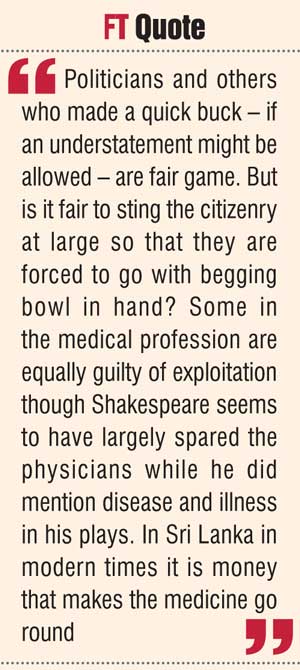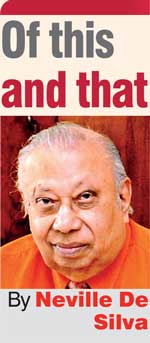Monday Feb 16, 2026
Monday Feb 16, 2026
Wednesday, 20 May 2015 00:00 - - {{hitsCtrl.values.hits}}
When one sees pictures these days of politicians and others in handcuffs virtually parading before a Court premises or the offices of an investigating agency, what is most striking is not so much their smiling faces as the images of the black-coated fraternity standing beside them.
The beaming smiles and  pretentious savoir faire might well be for the cameras. There is an old saying in Madison Avenue, that high street of American advertising, that any publicity is good publicity and a pair of handcuffs has been made out today to symbolise political harassment and the public embarrassment of the defeated.
pretentious savoir faire might well be for the cameras. There is an old saying in Madison Avenue, that high street of American advertising, that any publicity is good publicity and a pair of handcuffs has been made out today to symbolise political harassment and the public embarrassment of the defeated.
I spent several months in Colombo before and during the presidential election campaign and thereafter when the new Government was being put in place. It will be recalled that after the common candidate emerged and the campaign got going, many were the crossings and double crossings as ministers, MPs and others lower down the political pecking order ran hither and thither to register their new alliances or reiterate their old ones. Stories were planted in a pliant press or not-so-savvy media of where these politicos stood even before they actually got to their feet.
Some ran into trouble inside their political parties for what was seen as Judassian betrayal and sacked or threatened with sacking resulting in rush visits to lawyers of repute and even those lacking such credentials but were possessed of a black-coat which might have meant anything.
Legal fraternity making hay while the iron was hot
Anyway there I was at lunch one afternoon at a newly-opened Thai restaurant in Colombo (run by a young Thai girl who used to work for our embassy in Bangkok) with one of Sri Lanka’s most reputed (and expensive no doubt) lawyers. During the course of our wide-ranging conversation, he said that this was the best time for lawyers as anybody who was anybody with political paint on them was eager for consultations to seek legal advice.
Whether this was to prevent their ouster from the parties they belonged to or in anticipation of what might happen if the political tide turned and all their unsavoury doings were exposed to the public like un-cleared garbage in some Colombo streets, I really would not know.
But one thing was clear enough. The l egal fraternity – or some with indisputable credentials and genuine certificates to prove it – was making hay while the iron was hot, as intoned by a former colleague of mine at Lake House with notable bacchanalian propensities (who wasn’t in those good old journalistic times when even Parliament was easily accessible from the nearby pubs in the Fort that had a dilapidated Dickensian look).
egal fraternity – or some with indisputable credentials and genuine certificates to prove it – was making hay while the iron was hot, as intoned by a former colleague of mine at Lake House with notable bacchanalian propensities (who wasn’t in those good old journalistic times when even Parliament was easily accessible from the nearby pubs in the Fort that had a dilapidated Dickensian look).
Interpretation of Shakespearean thinking and writing
So the black-coated gentry sometimes mistaken for morticians at funerals, raking in the shekels in those frenetic days of political confusion, reminded one of Shakespeare’s words in Henry Vl Part 2, where Dick the Butcher, a lackey of rebel leader Jack Cade who sees himself as a ruler of England, says: “First thing we do, let’s kill all the lawyers.”
It is of course true that over the years lawyers have tried to interpret Shakespeare’s words to their own advantage, arguing (as they always do) that the good old Bard actually meant these nine words to be a tribute to lawyers and not a criticism of them.
In the past lawyers and their associations have claimed that it is the legal fraternity that has stood for the rule of law and order as against the chaos and breakdown of social order that would be spewed across by rebellion and the overthrow of the existing system.
Now it might well be that lawyers have mastered their Civil Procedure Code and the Interpretation Ordinance. But nowhere has it ever been stated that interpreting Shakespearean texts was ever a requirement to successfully hurdle the bar exams. Nor has it ever been so.
Naturally lawyers do not want to accept that the most-quoted of all literary figures was shooting his well-directed barbs at the legal eagles whose claim to excessive fees and what is tantamount to lengthy lawsuits were enough to drive any litigant to consider eliminating the legal tribe, certainly in thought, though not in deed.
The interpretation of Shakespearean thinking and writing is better left to those competent to do so just as we ordinary folk will not think of venturing into a discussion on the law of tort or fideicommissum which are matters beyond our understanding.
That however does not stop the public from sounding their protestations against the exorbitant fees charged by lawyers for their so-called expertise and for the laws delays often caused by lawyers seeking dates and postponing cases.
After all these centuries nothing seems to have changed
It would seem that even in Shakespeare’s time there was a distaste for lawyers and surely the rabble in the galleries watching the Bard’s barbs zeroing in on those in the more expensive seats would have expressed their joy in wild excitement.
After all these centuries nothing seems to have changed except that new stratagem have been added to the ways in which the public are hoodwinked by some lawyers such as colluding with the crooked to acquire and sell other people’s property.
Leaving those in the unofficial bar to make their living now that it is open season on political losers and their closest allies in and out of officialdom as my lunch companion candidly admitted, one can only hope that ordinary folk who cannot afford expensive lawyers would be spared a thought.
It is not only lawyers and doctors that sting you badly
Politicians and others who made a quick buck – if an understatement might be allowed – are fair game. But is it fair to sting the citizenry at large so that they are forced to go with begging bowl in hand? Some in the medical profession are equally guilty of exploitation though Shakespeare seems to have largely spared the physicians while he did mention disease and illness in his plays. In Sri Lanka in modern times it is money that makes the medicine go round.
But it is not only lawyers and doctors that sting you badly. Just last week I read in a local newspaper about two incidents in which some woman tea-pluckers and school children had been attacked by wasps and badly stung.
Wasps stinging people is not uncommon. It happens around Sigiriya too where foreign tourists are first stung by touts passing off as archaeological experts and then by wasps.
But what was intriguing about the news report was the headline which read ‘Wasps run amok in Central Province’. Now we have read of mobs running amok or protestors doing so and even others when the occasion demands. But wasps running amok-that must surely find space in the Guinness Book of Records or wherever such unique occurrences are recorded for posterity such as books on aberrant English.
That was not all. It appears that the police in Norwood and Hatton where the wasp attacks happened are conducting investigations. That is indeed laudable. At the end of it all, the intrepid police will track down the offending wasps, take them into custody and file plaint in the appropriate court.
The prosecution will doubtless be handed over to a lawyer the police usually employ. So on the appointed day, as it is called, the prosecuting lawyer will examine a witness.
“Witness, were you present at the scene when the attack happened?”
“Yes”
“Did you see this with your own eyes?”
“I am not sure sir.”
“What do you mean witness?”
“I have somebody else’s corneas grafted.”
“But your eyesight is good enough to identify the wasps. Now are these the wasps that stung the school children?”
“I don’t know sir. I did not wait to look. I ran inside the tea boutique.”
You could probably guess why Shakespeare’s observation on lawyers sounds so waspish.